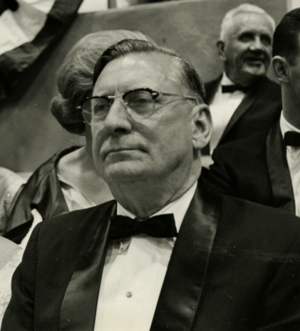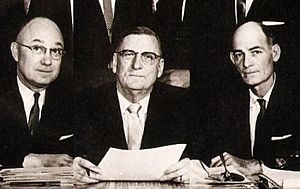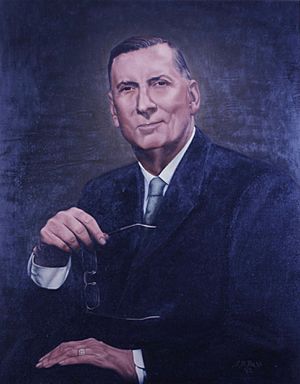Ross Barnett facts for kids
Quick facts for kids
Ross Barnett
|
|
|---|---|
 |
|
| 53rd Governor of Mississippi | |
| In office January 19, 1960 – January 21, 1964 |
|
| Lieutenant | Paul B. Johnson, Jr. |
| Preceded by | James P. Coleman |
| Succeeded by | Paul B. Johnson, Jr. |
| Personal details | |
| Born |
Ross Robert Barnett
January 22, 1898 Standing Pine, Mississippi, U.S. |
| Died | November 6, 1987 (aged 89) Jackson, Mississippi, U.S. |
| Political party | Democratic |
| Spouse | Mary Pearl Crawford |
| Military service | |
| Allegiance | |
| Branch/service | |
| Battles/wars | World War I |
Ross Robert Barnett (January 22, 1898–November 6, 1987) was the Governor of Mississippi from 1960 to 1964. He was a Southern Democrat who strongly supported racial segregation. This means he believed in keeping people of different races separate.
Contents
Early Life and Education
Growing Up in Mississippi
Ross Barnett was born in Standing Pine, Leake County, Mississippi. He was the youngest of ten children. His father, John William Barnett, had fought in the Confederate Army.
Ross served in the United States Army during World War I. After the war, he worked many jobs to pay for his education. He earned a degree from Mississippi College in 1922. Four years later, he got his law degree from the University of Mississippi (also called Ole Miss).
To save money, he worked as a janitor, barber, and salesman. He even organized a brass band.
Ross Barnett's Law Career
Ross Barnett started his law career while still in college. His first case was about a cow, which he won. Later, he opened his own law firm.
Over 25 years, he became a very successful lawyer in Mississippi. He earned a lot of money by helping people who were injured. Many of his clients were poor, both white and Black.
One law school dean said Barnett was "a brilliant jury manipulator." This meant he was very good at convincing juries. He also served as president of the Mississippi Bar Association for two years.
Family Life
In 1929, Ross Barnett married Mary Pearl Crawford, who was a school teacher. They had two daughters and one son together.
Ross Barnett's Political Journey
First Attempts at Governor
Ross Barnett used the money from his law career to enter politics. He tried to become Governor of Mississippi twice before, in 1951 and 1955, but he did not win. At that time, the Democratic Party was very strong in Mississippi. Winning the Democratic primary election was almost the same as winning the governorship.
Winning the Governorship
On his third try in 1959, Ross Barnett won the Democratic nomination. His campaign focused heavily on supporting segregation. He published a brochure called "Dynamic Leadership – To Keep Segregation and Improve Our Standard of Living." He also made statements saying that God made races different.
His campaign song, "Roll with Ross," was very popular. Its tune was later used for the state anthem, "Go, Mississippi". No Republican ran against him, so he won the election easily. He became governor on January 19, 1960. During his time in office, he celebrated 100 years since the American Civil War. He visited Civil War sites to honor soldiers from Mississippi.
Time as Governor and Civil Rights
As governor, Ross Barnett was a strong supporter of segregation. He became well-known for his conflicts with the Civil Rights Movement. This movement worked to end racial discrimination.
In 1961, Barnett arranged for the arrest of Freedom Riders. These were people who rode buses to protest segregation. They were sent to Parchman Farm prison. Even though their actions were minor, the Freedom Riders faced harsh conditions and humiliation in prison. Barnett reportedly told the guards to "Break their spirits."
While many people in Mississippi approved of his actions, Barnett also faced criticism for other reasons. He was accused of not keeping promises about jobs and giving jobs to friends. He was also a member of the Citizens' Councils, a group that supported white supremacy.
In 1962, Barnett tried to stop James Meredith, a Black student, from attending the University of Mississippi. This was Barnett's own former school. The state agency for universities even made Barnett the registrar to block Meredith. However, the accreditation of the state's medical school was at risk due to these actions. The board then reversed its decision.
Barnett was fined $10,000 and sentenced to jail for contempt of court. But he never paid the fine or spent time in jail. The charges were later dropped. Only two Mississippi lawmakers disagreed with Barnett's actions against federal orders. On September 13, Barnett said, "There is no case in history where the Caucasian race has survived social integration. We will not drink from the cup of genocide."
The night before the Ole Miss riot of 1962, Barnett gave a speech at a football game in Jackson. He said, "I Love Mississippi." Thousands of fans cheered and waved Confederate flags.
Barnett, who was a Baptist Sunday school teacher, linked segregation to the Bible. He said, "The Good Lord was the original segregationist. He put the black man in Africa." He also claimed that Black Americans loved Mississippi's way of life, which was segregation.
In 1963, Barnett tried to stop the Mississippi State University men's basketball team from playing against a racially mixed team from Loyola University Chicago. The team went against Barnett's wishes and played the game, which they lost.
After His Term as Governor
Ross Barnett's term as governor ended on January 21, 1964. Paul B. Johnson, the lieutenant governor, became the new governor. Barnett strongly opposed the idea of two main political parties in Mississippi, which had long been dominated by Democrats. He campaigned for Paul Johnson and other Democratic candidates.
Soon after leaving office, Barnett was present at the first trial of Byron De La Beckwith. Beckwith was accused of murdering Medgar Evers, a civil rights activist. During the trial, Barnett shook hands with Beckwith. Beckwith was later convicted many years later. This case was shown in the movie Ghosts of Mississippi.
Later Life

Barnett tried to become governor again in 1967 but did not win. He then went back to practicing law. He continued to believe in his past actions. He said, "Generally speaking, I'd do the same things again." He also farmed and gave speeches to groups like the American Legion.
In 1982, when asked about the Ole Miss riot of 1962, Barnett stated, "I have no regrets, no apologies to make."
The Ross Barnett Reservoir, located near Jackson, is named after him. In May 2022, there was a petition to rename the reservoir. A lake in Smith County was also named after him before it was renamed Lake Prentiss Walker.
Images for kids
See also
 In Spanish: Ross Barnett para niños
In Spanish: Ross Barnett para niños
 | Leon Lynch |
 | Milton P. Webster |
 | Ferdinand Smith |



